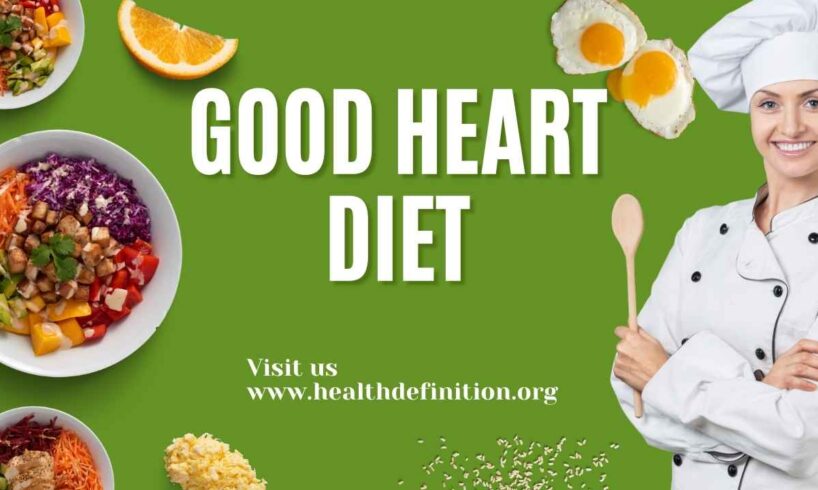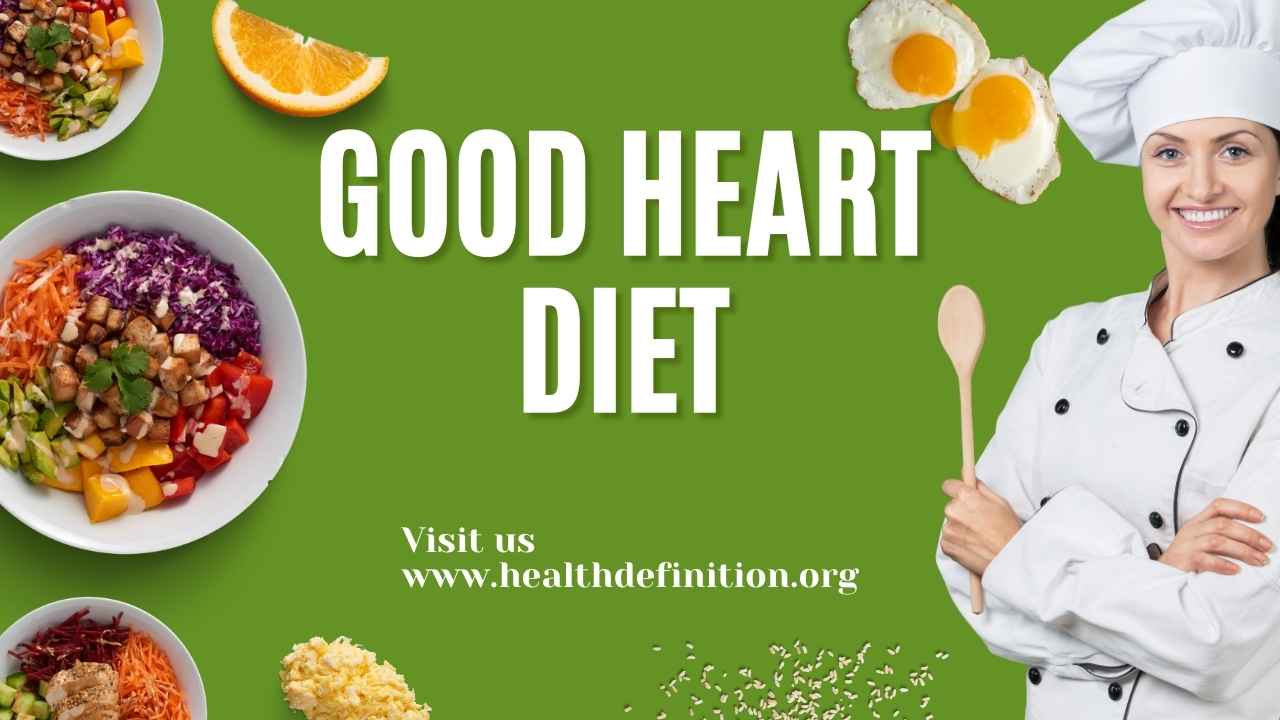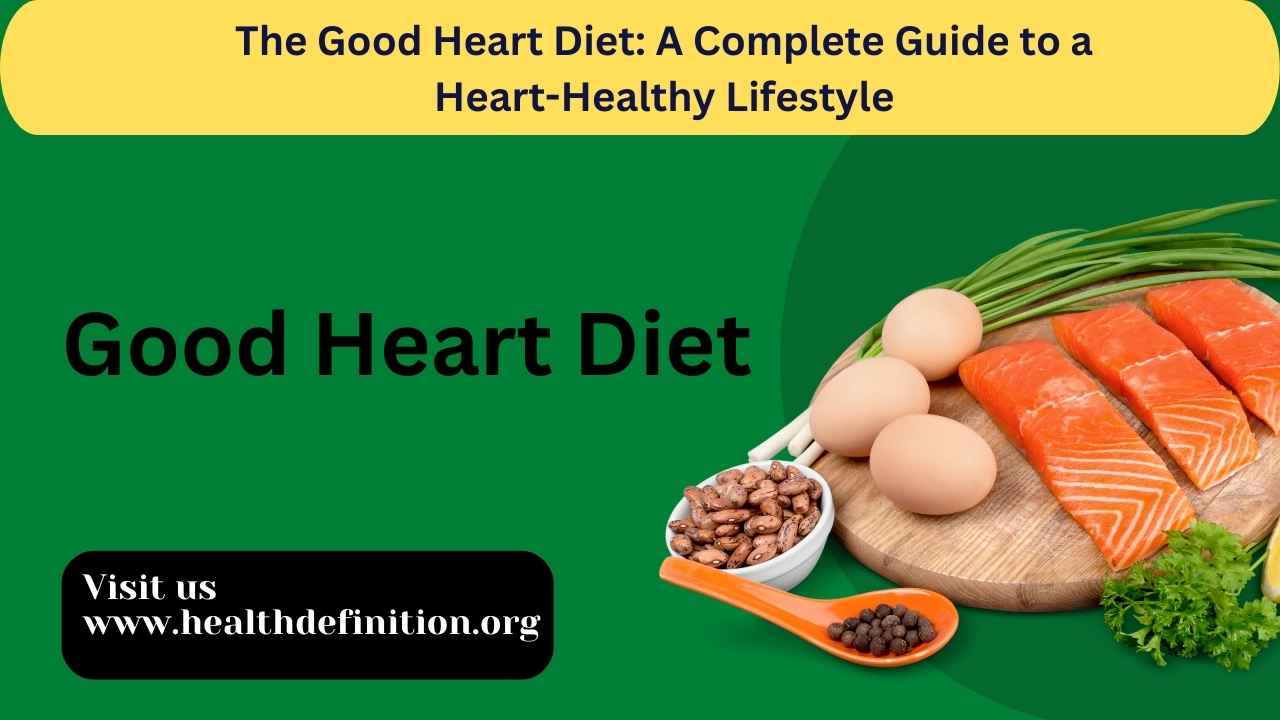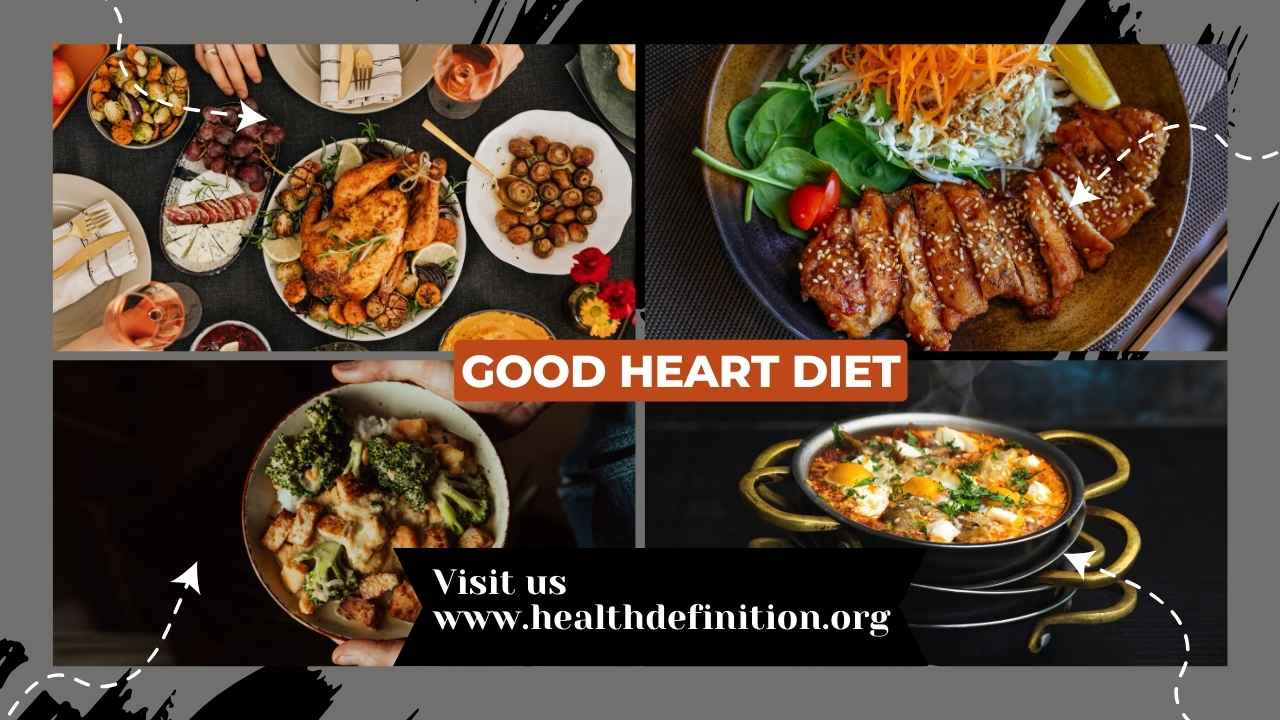
Good Heart Diet: Cardiovascular diseases (CVDs) are among the leading causes of death worldwide, but the good news is that many heart conditions can be prevented through lifestyle and dietary choices. Following a Good Heart Diet is one of the most effective ways to maintain heart health, reduce cholesterol, regulate blood pressure, and improve overall well-being.
This guide will walk you through the best foods to eat, those to avoid, and the fundamental principles of a heart-healthy diet.
What Is a Good Heart Diet?
A Good Heart Diet is designed to promote cardiovascular health by reducing inflammation, managing cholesterol levels, and keeping blood pressure in check. It emphasizes whole foods rich in nutrients, fiber, healthy fats, and antioxidants while minimizing processed foods, unhealthy fats, and excessive sodium.
Key Principles of a Heart-Healthy Diet:
- Emphasize Whole, Unprocessed Foods
- Incorporate Healthy Fats (Omega-3s and monounsaturated fats)
- Reduce Sodium Intake
- Eat More Fiber-Rich Foods
- Limit Sugary and Processed Foods
- Stay Hydrated and Exercise Regularly
Best Foods for a Healthy Heart
Fruits and Vegetables
Loaded with vitamins, minerals, fiber, and antioxidants, fruits and vegetables help lower blood pressure, reduce inflammation, and improve cholesterol levels.
- Best choices: Leafy greens, berries, oranges, tomatoes, carrots, and bell peppers.
Whole Grains
Whole grains are rich in fiber, which helps lower bad cholesterol (LDL) and support heart health.
- Best choices: Oats, quinoa, brown rice, whole wheat, and barley.

Good fats help reduce inflammation and promote good cholesterol (HDL).
- Best choices: Avocados, olive oil, nuts, seeds, and fatty fish like salmon.
Lean Proteins
Protein is essential for muscle health, including the heart muscle, without adding unnecessary fats.
- Best choices: Skinless poultry, fish, beans, lentils, and tofu.
Nuts and Seeds
Packed with omega-3 fatty acids, fiber, and healthy fats, nuts and seeds promote heart health.
- Best choices: Walnuts, flaxseeds, chia seeds, and almonds.
Legumes
Beans and lentils are great sources of fiber and plant-based protein, helping reduce bad cholesterol and support heart health.
- Best choices: Black beans, chickpeas, and lentils.
Low-Fat Dairy
Dairy products provide calcium and protein without the saturated fat found in full-fat options.
- Best choices: Greek yogurt, skim milk, and low-fat cheese.
Herbs and Spices
Using natural seasonings instead of salt can help lower blood pressure and improve circulation.
- Best choices: Turmeric, garlic, ginger, and cinnamon.
Foods to Avoid for Heart Health
Trans Fats and Saturated Fats
Unhealthy fats increase bad cholesterol and the risk of heart disease.
- Avoid: Fried foods, margarine, fast food, and processed snacks.
Excess Sodium
Too much salt can raise blood pressure and cause heart strain.
- Avoid: Canned soups, processed meats, and salty snacks.
Refined Carbohydrates and Sugars
Excess sugar and refined carbs contribute to obesity, diabetes, and heart issues.
- Avoid: White bread, pastries, sugary cereals, and soda.
Processed and Red Meats
Processed meats contain high sodium and preservatives, increasing heart disease risk.
- Avoid: Bacon, sausage, hot dogs, and deli meats.
Excessive Alcohol
While moderate alcohol consumption may have some benefits, excessive drinking can raise blood pressure and increase heart disease risk.
- Limit to: One drink per day for women, two for men.
Lifestyle Tips for a Healthy Heart
Exercise Regularly
Aim for at least 30 minutes of moderate exercise five times a week, such as walking, cycling, or swimming.
Manage Stress
Inveterate push can lead to tall blood weight. Hones like contemplation, yoga, and profound breathing can offer assistance diminish stretch.
Stay Hydrated
Drinking enough water supports circulation and overall heart function. Aim for 8–10 glasses per day.
Maintain a Healthy Weight
Being overweight increases the risk of heart disease. Combine a heart-healthy diet with regular exercise to manage weight effectively.
Get Enough Sleep
Lack of sleep can lead to high blood pressure and heart problems. Aim for 7-8 hours of quality sleep per night.

Sample One-Day Good Heart Diet Meal Plan
Breakfast:
- Oatmeal with flaxseeds, walnuts, and fresh berries
- Green tea or a glass of water
Lunch:
- Grilled salmon salad with leafy greens, cherry tomatoes, and olive oil dressing
- Whole grain toast on the side
Snack:
- A handful of almonds and an apple
Dinner:
- Quinoa and black bean stir-fry with vegetables
- Steamed broccoli with a sprinkle of turmeric
Dessert:
- Dark chocolate (at least 70% cocoa) with a handful of nuts
Start making small changes today—your heart will thank you for it!
What foods should heart patients avoid?
Heart patients should avoid foods that can increase the risk of heart disease, high blood pressure, and cholesterol levels. Here are some of the worst offenders:
Trans Fats and Saturated Fats
- Found in: Fried foods, margarine, processed snacks, fast food, and baked goods.
- Why? Raises bad cholesterol (LDL) and lowers good cholesterol (HDL), increasing heart disease risk.
Processed and Red Meats
- Found in: Bacon, sausage, hot dogs, salami, and deli meats.
- Why? High in saturated fats and sodium, increasing the risk of high blood pressure and heart disease.
Excess Sodium (Salt)
- Found in: Canned soups, salty snacks, fast food, processed meals, and pickles.
- Why? Raises blood pressure and strains the heart.
Refined Carbohydrates and Sugar
- Found in: White bread, pasta, pastries, sugary cereals, and soda.
- Why? Causes blood sugar spikes, obesity, and increases the risk of diabetes and heart disease.
Sugary Beverages
- Found in: Sodas, energy drinks, fruit-flavored drinks, and sweetened coffee drinks.
- Why? Adds empty calories, raises blood sugar, and contributes to obesity.
Alcohol in Excess
- Found in: Beer, wine, and liquor.
- Why? Can raise blood pressure, lead to obesity, and weaken heart function when consumed in large amounts.
High-Fat Dairy Products
- Found in: Whole milk, butter, cream, cheese, and full-fat yogurt.
- Why? High in saturated fat, which can raise cholesterol levels.
Fast and Junk Foods
- Found in: Burgers, fries, pizza, chips, and processed snacks.
- Why? High in unhealthy fats, sodium, and calories, increasing heart disease risk.
Deep-Fried Foods
- Found in: Fried chicken, French fries, onion rings, and doughnuts.
- Why? High in trans fats, leading to artery blockage and inflammation.
Canned and Processed Foods
- Found in: Canned meats, soups, instant noodles, and frozen dinners.
- Why? Packed with sodium and preservatives, increasing heart disease risk.
Healthier Alternatives
Instead of these harmful foods, opt for fruits, vegetables, whole grains, lean proteins, nuts, seeds, and heart-healthy fats like olive oil and avocados.
Making your heart stronger requires a combination of healthy lifestyle choices, regular exercise, and a balanced diet. Here are some of the best ways to improve heart health:
Exercise Regularly
- Aim for 30–60 minutes of moderate exercise most days of the week.
- Best exercises for heart health:
- Cardio: Walking, jogging, cycling, swimming, or dancing.
- Strength training: Lifting weights or bodyweight exercises (push-ups, squats).
- Flexibility & balance: Yoga or stretching to reduce stress and improve circulation.
Eat a Heart-Healthy Diet
- Increase:
- Fruits and vegetables (rich in vitamins and antioxidants).
- Whole grains (oats, brown rice, quinoa).
- Healthy fats (avocados, nuts, olive oil, fatty fish).
- Lean proteins (chicken, beans, tofu, fish).
- Avoid:
- Processed foods, trans fats, excessive sodium, and sugary drinks.
Maintain a Healthy Weight
- Excess weight increases the risk of heart disease, high blood pressure, and diabetes.
- Focus on portion control and mindful eating.
Manage Stress
- Practice relaxation techniques: Deep breathing, meditation, or yoga.
- Get enough sleep: Aim for 7–9 hours per night.
- Stay socially active: Strong relationships can help reduce stress.
5. Quit Smoking & Limit Alcohol
- Smoking damages arteries and raises blood pressure. Quitting can significantly improve heart health.
- Alcohol in moderation: No more than one drink per day for women, two for men.
6. Stay Hydrated
- Drink at least 8 glasses of water daily to support circulation and heart function.
Monitor Blood Pressure & Cholesterol
- Keep blood pressure below 120/80 mmHg.
- Maintain healthy cholesterol levels by avoiding saturated fats and trans fats.
Get Regular Check-Ups
- Visit your doctor for routine heart health screenings and to check for risk factors.
By making these changes, you can strengthen your heart, lower your risk of heart disease, and improve overall health.
Conclusion
The Good Heart Diet is not just about avoiding bad foods; it’s about embracing a lifestyle that nourishes your heart. By choosing nutrient-rich whole foods, avoiding harmful ingredients, and incorporating heart-healthy habits, you can reduce your risk of heart disease and live a longer, healthier life.

FAQs about “good heart diet”
What is a good heart diet?
A good heart diet is a balanced eating plan that promotes cardiovascular health by reducing cholesterol, controlling blood pressure, and lowering inflammation. It includes fruits, vegetables, whole grains, lean proteins, healthy fats (like olive oil and nuts), and fiber-rich foods while avoiding processed foods, trans fats, excess sodium, and added sugars.
What are the best foods for heart health?
The best heart-healthy foods include:
- Fatty fish (salmon, mackerel) – rich in omega-3s
- Leafy greens (spinach, kale) – high in antioxidants
- Whole grains (oats, brown rice) – packed with fiber
- Nuts and seeds (walnuts, flaxseeds) – heart-protective fats
- Berries (blueberries, strawberries) – loaded with polyphenols
- Olive oil – a great source of monounsaturated fats
What foods should I avoid for good heart diet?
To protect your heart, limit or avoid:
- Trans and saturated fats (fried foods, processed snacks)
- Excess sodium (canned soups, fast food, salty snacks)
- Refined carbs and sugars (white bread, soda, sweets)
- Processed and red meats (bacon, hot dogs, deli meats)
- High-fat dairy (whole milk, butter, cream)
Can I eat meat on a good heart diet?
Yes, but choose lean protein sources like skinless poultry, fish, and plant-based proteins (beans, lentils, tofu). If consuming red meat, opt for lean cuts in moderation and avoid processed meats.
How does diet affect heart disease risk?
A poor diet high in unhealthy fats, sodium, and refined sugars can lead to high cholesterol, high blood pressure, obesity, and inflammation, all of which increase the risk of heart disease. On the other hand, a nutrient-rich, balanced diet can reduce these risks and support overall heart health.
Bullet points about “good heart diet”
✔️ Eat More Whole Foods – Focus on fruits, vegetables, whole grains, nuts, and seeds for essential nutrients and fiber.
✔️ Choose Healthy Fats – Include olive oil, avocados, fatty fish, and nuts, while avoiding trans and saturated fats.
✔️ Limit Processed and Sugary Foods – Good heart diet, reduce refined carbs, sugary drinks, and processed snacks that can raise blood sugar and cholesterol.
✔️ Reduce Sodium Intake – Opt for fresh herbs and spices instead of salt to help manage blood pressure.
✔️ Prioritize Lean Proteins – Choose fish, skinless poultry, beans, and tofu over red and processed meats.
✔️ Stay Hydrated and Active – Drink plenty of water and engage in regular exercise to support heart health.
Related post:
Best Fruits to Eat Daily for a Healthier Life
Food with Healthy Carbohydrates: The Ultimate Guide to Nutritious Eating






